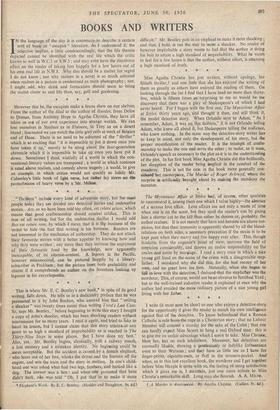This is where Mr. E. C. Bentley's new book,* in
spite of its good writing, falls down. He tells us in a dedicatdry preface that he was persuaded to it by John Buchan, who assured him 'that " writing a shocker " was twenty times easier than writing Trent's Last Case. So, says Mr. Bentley, " before beginning to write this story I bought a copy of John's shocker, which has been shocking readers without intermission for so many years. I read it again, and tried to take to heart its lesson, but I cannot claim that this story attains. at any point to so high a standard of improbability as is reached in The Thirty-Nine Steps in some places. But I have done my best." Alas, yes.. Mr. Bentley begins, classically, with a railway smash, a lost memory and a mistaken identity. No beginning could, be more acceptable. But the accident is caused by a female elephant, who leans out of her box, whisks the driver and the fireman off the engine, and sets the train and the story in motion. In one's child- hood one was asked what had two legs, feathers, and barked like a dog. The answer -was a hen ; and when orte protested that hens didn't bark, ate was told " Oh, I put that in to make it more * Elephant's Work. By E. C. Bentley. (Hodder and Stoughton. 9s. 611.) difficult." Mr. Bentley .puts in an elephant to make it more shocking ; and that, I hold, is not the way to write a shocker. No reader of however impi-obable a story wants to feel that the author is doing his hist to attain a high standard of improbability. What he wants to feel for a few hours is that the author, without effort, is attaining a high standard of truth.














































 Previous page
Previous page